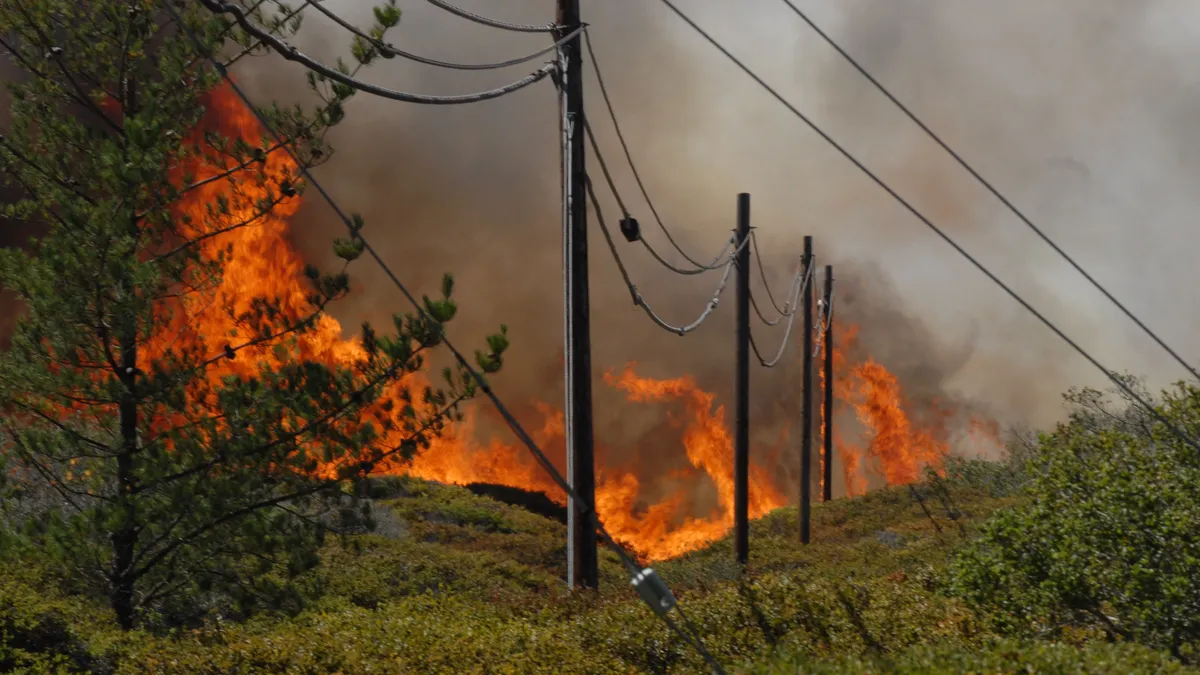Dive Brief:
- A California lawmaker is preparing to introduce legislation designed to give Pacific Gas & Electric more financial stability as it deals with wildfires that come with billions of dollars in costs and potential liability.
- The bill would extend provisions of previous wildfire liability legislation, passed this fall to address 2017 fires, to include fires this year. In particular the legislation would provide some certainty for PG&E related to the ongoing Camp Fire, which has killed 88 people and is the state's deadliest ever.
- The new legislation will not include changes to California's "inverse condemnation" rules which allow utilities to be held liable for fire damages if their equipment causes the blaze, even if they have followed all safety rules.
Dive Insight:
While the Camp Fire is contained, tackling the financial impacts on PG&E is a delicate topic. The fires have wreaked havoc on the utility's shareholders, raised the specter of bankruptcy and caused regulators to mull breaking up the company, leaving little opportunity for lawmakers to wait for a more appropriate-looking time.
This month, shares of PG&E fell off a cliff when California's fire protection agency raised the possibility that the Camp Fire may have been caused by the utility's equipment. Shares began in November at almost $50, but closed yesterday at $25/share.
And shares had traded even lower, but recovered some when California Public Utilities Commission President Michael Picker commented mid-month that the agency did not want to see PG&E go bankrupt.
Kellie Smith, a consultant for California Assembly's Utilities and Energy Committee, told Utility Dive that the new legislation aims to back up Picker's comments. The bill will be introduced by Assemblyman Chris Holden as soon as Dec. 3.
Holden "wanted to signal reinforcement for Picker's comments," said Smith. "Bankruptcy is not an option."
The new legislation will essentially extend provisions of SB 901, which lawmakers passed to address the impacts of last year's fire season. That law allowed investor-owned utilities to file with the CPUC and recover some fire costs retroactively, and established a new standard for determining "just and reasonable" costs that IOUs seek to recover.
What the legislation does not do, is tackle the debate over the state's inverse condemnation rules. Gov. Jerry Brown had pressed for SB 901 to include language that would have changed the interpretation, but lawmakers revolted because it looked like a utility bailout heading into the election.
Smith said work on liability issues will wait until next year, when "we have a new legislature and a new governor."
Brown was not eligible to run for re-election due to term limits. Incumbent Lieutenant Governor Gavin Newsom won election and will replace him in January.
"This is a tough issue to bring up, because we don't want to detract from the current tragedy," said Smith. But she also said Holden's bill is needed to send a message to the people buying and selling shares of PG&E.
"The market being the way it is, it immediately responds," she said.
Utility officials are staying away from the issue, so far.
“There will be a time and a place for all this, but right now, we are solely focused on helping the first responders and helping our customers recover and rebuild," PG&E said in an emailed statement.















